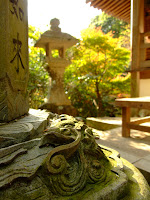Tokyo Graffiti: Summer Lifestyle
 It has been a while since I reviewed an edition of the magazine Tokyo Graffiti, because it was in truth a little plain during spring. But the late Summer edition heralded a new high in the magazine's achievements (which are many) so I shall return to singing its praises.
It has been a while since I reviewed an edition of the magazine Tokyo Graffiti, because it was in truth a little plain during spring. But the late Summer edition heralded a new high in the magazine's achievements (which are many) so I shall return to singing its praises.The September Tokyo Graffiti had as its topic "a collection of Summer Beach photos", its cover adorned with a series of pictures of girls in bikinis. But the contents were so much more than mere beach babery, and well worth comment.
Of course this edition had its regular entries: Tokyo Beauty and Tokyo Handsome, shots of individuals and couples on the streets in Tokyo, a page devoted to "beautiful older sisters", the recently-added "Grandpa's diary" (2 pages devoted to an old man's life story, in pictures), "sexy boy calendar", Tokyo local style and "living by yourself Gallery" (pictures of 1 room Tokyo apartments). These were up to their usual high standards, but were surpassed this month by the special feature, a series of multi-page spreads depicting Tokyo summer beach life.
First was a couple of pages of beach fashion, boys and girls displaying their choice of clothing. This was followed by a few pages of "bikini beach girls" who were, as is usual for Tokyo Graffiti, not of the usual strain of typical girls, but the ones the photographers thought were a little quirky or unique. All were, of course, supernaturally skinny (because supernaturally skinny people in this country are normal). Bikini beach girls were followed by "bikini girls on the street", women in bikinis returning to the beach carrying things they had bought.
This is of course standard Tokyo Graffiti fare, pictures of peoples' fashion. But after this it got interesting. Next was "Couples on the beach", a 2 page spread consisting of a picture of a girl sitting in the sand, with in the background her boyfriend running dramatically towards the camera, carrying cold drinks for both of them. The accompanying caption described them and gave information on their beach fashion.
This amusing little section was followed by "what are you eating now", 2 pages of perhaps 100 photos of people eating, all wearing swim suits and all saying what they are eating at that time. Most of the girls were eating water melon or shaved ice; most of hte boys were eating noodles or sausages. Everyone had to be pulling a strange expression while they ate.
Lastly came the three best parts of the magazine. First, "various leisure seats", a 2 page spread showing friends and couples lying down on their beach mat. The beach mat is, of course, a big plastic tarpaulin spread on the sand, with crazy patterns painted all over it. Some had penguins, some letters, some sunflowers, one a big green elephant. Following this was "The energy of young man", photos of men doing stupid things in the sea, mostly involving jumping or splashing.
And lastly, best of all, "Ukiwa puka puka girls", pictures of women floating in the sea in their inflatable rings. Japanese girls seem to have a universal floating style, which involves suspending themselves in the ring with their arse in the water, feet dangling in the air and hands splashing in the water. Since I am too scared of swimming to even consider turning on my back anywhere near the sea, I am incapable of imagining how this feels. But Japanese women (and it is always the women who do this) seem very familiar with the experience. The Tokyo graffiti crew, in addition to taking a photo, had asked the girls "What are you floating on?" The answers are less than a sentence long but are beautiful in their simplicity:
- the current era
- fashion, or the current fad
- the speed of time
- being satisfied by a person I like
- music
- a boy

















